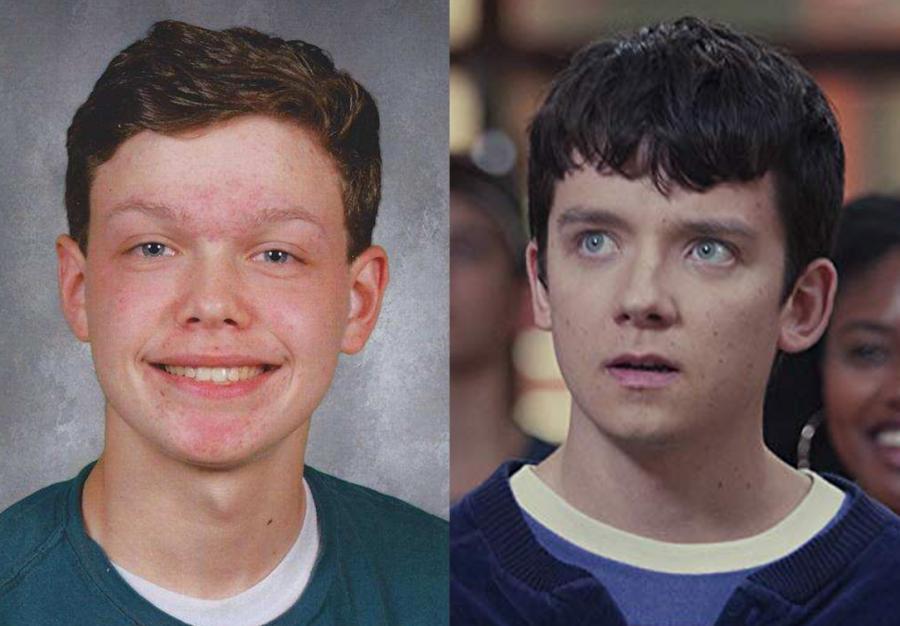Free the Pimple: Puberty Chic Going Through Changes
OWEN ROCHE/THE OBSERVER AND SAM HALL/NETFLIX
Left: the writer at 16. Right: Asa Butterfield, 22, masquerading as a 16-year-old in “Sex Education” (2018).
February 19, 2019
Being American and going through puberty is a unique tradition of ours. It’s an experience that unites across religion, color, creed and privilege — up to a decade or more of awkwardness, mental and physical, is indeed the single greatest instance of evolutionary hazing — and rightly the bedrock of our nation.
And it sucks.
Anthropologist Margaret Mead took a look at adolescents on faraway islands and told us about as much — that the moody, angsty, self-conscious and sexually-repressed youth given hours of homework a night over in the land of the free aren’t exactly the gold standard of formative human development.
No citizen is safe. Sooner or later, we get pimples. Everywhere. Our voices change. We get lumps in weird places. Sometimes, we want everyone to die. Sometimes, we feel like dying ourselves. We try to blend in and stand out at the same time like camo pants in a K-Mart: poorly on both accounts.
Oh, and we’re so unbelievably horny.
As American bodies transition from childhood to adulthood, the imbalanced brains that pilot them are just as developmentally wonky and even more vulnerable. Sadly, barring the collapse of capitalism and a collective change of heart in the next couple of years, kids and teens in America will be treated the same way their parents were, and their parents before them — knowing that they’re changing, knowing that they’re disproportionate and never being equipped with enough information to handle it.
And they’ll continue to have that unshakable feeling that no one understands them or what they’re going through until they’re old enough and have clear enough skin to pretend like it never happened.
Where do brace-faced, tent-pantsed American pubescents turn for validation? It’s too risky to depend on parents. Their knowledge of labia and scrota too often calls into question their very parenthood.
When bad grades and weird hairs get them down, kids and teenagers need a distraction.
So, they turn on the TV. They go to the movies. They open Netflix.
The depiction of high school life on screens big and small is perhaps an equally American tradition. Nostalgia, our national pastime, drives us to seek out representations of our past — the “That ’70s Shows,” the “Greases” and the “Goldbergses” of our time provide us with just such an outlet. They give us a taste of the past — our past, perhaps, with an accuracy more rosy than rosacea. Do you picture it in your mind yet? Do visions of 30-year-olds pretending to be teenagers dance through your head?
America has been crushing on puberty chic big time.
“Pretty Little Liars” would perhaps be more accurate if the actors were shown going out for drinks after third period or filling out rental car forms. Jason Earles, a 39-year-old man, played Hannah Montana’s co-star Jackson Stewart. Did we hear about his character’s nocturnal emissions? His struggle with sexual identity? Did we see a single pimple?
Nobody put Baby in a corner, but they certainly cast her 17-year-old character with a woman 10 years her senior.
It’s spelled out plainer than a TV show teacher’s name underlined on a green chalkboard: we’re ashamed of what we looked like in middle school. We cringe at what we did, how we dressed and whom we crushed on in high school.
Instead of looking back and laughing, we go to great lengths to convince ourselves and everyone around us that high school wasn’t like that for us. We were cool, wore leather jackets and had a fully-settled facial bone structure. Puberty chic is so ingrained in American pop culture — we’re so ashamed of our first periods in first period — that we risk passing our revisionist habits on to the next generation.
Alas, we’re not out of the woods yet. Contemporary shows like “Sex Education” on Netflix get the second part right — that growing up doesn’t have to be a taboo subject — but the message falls flat when it’s told by a 22-year-old.
It’s discouraging to walk the line this way, implying that the validation of kids and teens is valuable but that they’re just too unfit to deliver the message themselves. Is it too much to ask to have a movie called “Eighth Grade” played entirely by actual eighth graders?
However, the trend could be starting to reverse. Only now have we started to dab the Tretinoin gel of reality on the angry, swelling zit of puberty denial, or so I hope.
“Big Mouth” is the biggest ray of hope for such a counter-movement. The smash Netflix hit, two seasons in and going strong, chronicles in vivid detail middle school kids fighting mood swings, questioning their sexualities and getting their first periods at the Statue of Liberty. Though their voice actors are far beyond their pubescent years, the animated characters are undeniably, often grotesquely teenage.
That the brash, vulgar lessons of the show have resonated so much with audiences suggests that it’s now as cool as ever to talk about sex and growing up in a genuine way. The people who need to hear it most get the message, and those who’ve been through it already might even crack a smile as they begrudgingly relate.
This representation and validation are long overdue. We’ve made steps in the right direction, but we have a ways to go before facing the ugly truth goes completely mainstream. Puberty chic isn’t cool — and neither are America’s adolescents — but representation certainly is.











